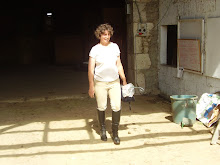Kelsey:" I think I now comprehend the idea of circling, but I'm
not sure how he is supposed to say what he has when he doesn't have the words
for "horse" or "bike" yet. Should he say it in
French, then I write it on the "board"? (I think I'm just going to have a piece of
paper between us to act as the board) for him to refer to? Or should I
not make him talk at all?"
It's okay for him to say "cheval" which shows that he's
understood your question. And yes, write it down with the translation.
Horse = cheval. Then say it. In TPRS classrooms very short, one or
two word answers in the first language are allowed when students don’t have the
vocabulary they need. So they are not
kept from participating and you can decide whether it’s a word you want to
teach or not. If you think it useful, you translate the word, put it on
the board (or a piece of paper) and refer back to the written translation as
often as needed. This is called "Point and Pause." You
point at the word they need and pause to give time for processing. What
you don't want is a long complicated answer, often with a subordinate clause
:-(, because you don't want to get side-tracked.
And you'll find that there are a lot of English expressions that have been
adopted into French. We call them “transparent”. (When I use the film "Shawshank
Redemption", there's the word "turnout" which I always had a lot
of difficulty in explaining to my students. Then I went to a student's
house and she asked where I had parked.
When I explained, she said, "Oh,
vous vous êtes garé dans le turnout." She's from the north of France,
and it seems that they call the turnout "un turnout".
Remember, when you start in on your story, you can accept or refuse his
suggestions. It’s always your
story. So, unless he's very interested
in horses, I'd prefer bike, because it's used more often. Keep your
vocabulary as high frequency as possible. If he brings in a French word
that you hadn't anticipated, think about how useful it will be before you decide
whether or not to go with it.

No comments:
Post a Comment